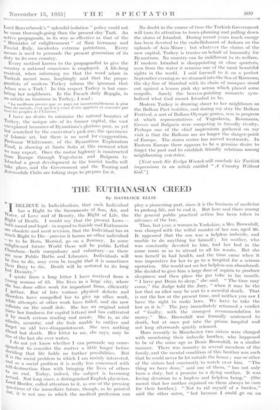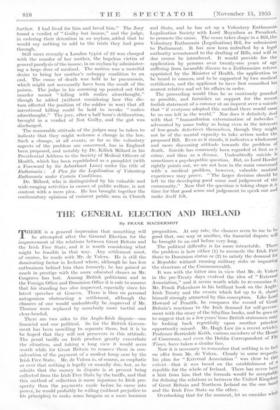THE EUTHANASIAN CREED
By HAVELOCK ELLIS fi I3ELIEVE in Individualism, that each Individual „,A. has a Right to the Sacraments of Sun, -Air, and Water, of Love and of Beauty, the 'Right of Life, the Right of Death. I would say that the present Laws_ both moral and legal—in regard to Suicide and Euthanasia are obsolete and need revision, that the Individual has as unich Right to Die—proviso it harms no other individual "'--as to be Born, Married, go on a Journey. In some enlightened future World there will be public Lethal `'.,11arnbers-both compulsory and voluntary—as there are now Public Baths and Libraries. Individuals will be free to die, may even be taught that it is sometimes their acir Dirty to 'die. Death will be restored to its long DiVinity." Tiote from a long letter I have received from ti ..'011ing woman of 25. She lives in a large city, where She has done office work for important firms, efficiently disorders gather. ' But' Of late various physical defects and haVe compelled her to give up office work, While attempts 'at other work have failed, and she now kibsists on the small dole. She has an original mind Inote 'her fondness for capital letters)' and has cultivated4t.,137 "Mich serious reading and music. ' She' is, as she neurotic,' and She feels Unable to. outlive and ,,"urget an odd love-disappointment. She sees nothing but death, Her lettei to me, she says, may be Cit'e of the last she ever writes. I do not yet know whether I can persuade my cerre- Pndent to consider the matter a little longer before 'eelding that life' holds no further' possibilities. But it 15 the Social problem in which I am mainly interested, and as a social 'problem it is really' less concerned with 'ed-destruetion than with bringing the lives of others t6 an end. Today, indeed, the subject is becoming actual, Not long since, a distinguished English physician, Lord Horder, called attention to it, as one of the pressing questions of' the immediate future, though, as he pointed ut, it is' not one in which the medical profession can play a pioneering part, since it is the business of medicine to prolong life, not to end it. But here and there 'among the general public practical action has been taken in advance of the law.
Thus, last year, a woman in Yorkshire, a Mrs. Brownhill, was charged with the wilful murder of her son, aged 36. It appeared that the son was a helpless imbecile, and unable to do anything for himself ; his mother, who was constantly devoted to him, had her bed in the same room so 'as to attend to all his wants. But she was herself in bad health, and the time came when it was imperative for her to 'go to a hospital for a serious operation. She would not sec her helpless son abandoned: She decided to giVe him A. large dose of aspirin to produce sleepiness and then place the gas tube in his mouth: " I have put Denis to sleep," she said. '" The time may come," the Judge told the Jury, " when it may be the law that an idiot may be sent to a merciful death. That is not the law at the present time, and neither you nor I have the right to make laws. We have to take the law as it is.": The jury immediately returned a verdict of " Guilty, with the strongest recommendation to mercy." Mrs. Brownhill was formally sentenced to death, but at once put into the prison hospital and not long afterwards quietly released, . More recently in Manchester two sisters were charged with murdering their imbecile .brother, who happened to be 'of the :same age as Denis Brownhill, in a similar manner. There was insanity in several members of the family, and the mental condition of this brother was such that he could never be let outside the house ; one or other of the sisters had constantly: to watch over him. "The thing we have done," said one of them, " has' hot only been a duty, but a promise to a dying mother. It was loving devotion 'to a hapless and helpless being." : (She meant that her mother enjoined on them always to care for' their brother:) " Not: to rid myself 'of a burden," said the other sister, " but because I could . go on no further. I had lived for him and loved him." The Jury found a verdict of " Guilty but insane," and the judge, in ordering their detention in an asylum, added that he would say nothing to add to the trials they had gone through.
Still more recently a London typist of 22 was charged with the murder of her mother, the hopeless victim of general paralysis of the insane, in an asylum by administer- ing a large dose of medinal. The motive was a merciful desire to bring her mother's unhappy condition to an end. The cause of • death was held to be pneumonia, which might not necessarily have been the result of the poison. The judge in his summing up pointed out that murder meant " killing with malice aforethought," though he added (without considering how this dic- tum affected the position of the soldier in war) that all intentional killing could be held to invoke " malice aforethought." The jury, after a half hour's deliberation, brought in a verdict of Not Guilty, and the girl was discharged.
The reasonable attitude of the judges may be taken to indicate that they might welcome a change in the law. Such a change, at all events, so far as the voluntary aspects of the problem are concerned, has in England been proposed, and notably by Dr. Killick Millard in his Presidential Address to the Society of Medical Officers Of Health, which has been republished as a pamphlet (with a Foreword by Sir Arbuthnot Lane) under the title of Euthanasia : A Plea for the Legalisation of Voluntary Euthanasia under Certain Conditions, Dr. Millard, who. is distinguished by his valuable and Wide-ranging activities in causes of public welfare, is not content with a mere plea. He has brought together the confirmatory opinions of eminent public men in Church and State, and he has set up a Voluntary Euthanasia Legalisation Society with Lord Moynihan as President, to promote the cause. The cause takes shape in a Bill, the Voluntary Euthanasia (Legalisation) Bill, for submission to Parliament. It has now been redrafted by a legal authority accustomed to the drafting of Bills, and will in due course be introduced. It. would provide for the application by persons over twenty-one years of age suffering from incurable disease to a Euthanasian referee appointed by the Minister of Health, the application to be heard in camera, and to be supported by two medical certificates, and the applicant to have first consulted his nearest relative and set his affairs in order.
The proceeding Would thus be as cautiously guarded as possible, and furnishes no support for the recent foolish statement of a coroner at an inquest over a suicide that " if everyone adopted this method there would soon be no one left in the world." Nor does it definitely deal with that " humanitarian extermination of imbeciles " advocated by some today as being even in the interests of low-grade defectives themselves, though they might not be of the mental capacity to take action under the proposed Bill. Even as it stands, it indicates a wholesome and more discerning attitude towards the problem of death. Suicide has commonly been regarded at first as a crime, and then as a disease. Undoubtedly suicide is sometimes a psychopathic question. But, as Lord. Horder rightly points out, we are not here in the main concerned with a medical problem, however, valuable medial experience may prove. " The larger decision should be left to the developing good sense and judgement of the community." Now that the question is taking shape it is tithe for that good sense and judgement to speak out and make itself felt.











































 Previous page
Previous page